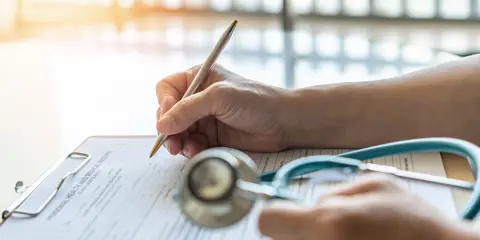
Fatema Alqenae
@alqenaie
Pharmacist, Kuwait Ministry of Health

Medication errors are a key pharmacovigilance issue, especially as patients transition between secondary and primary care as they readjust to life outside of hospital.
Medication-related problems are increasingly recognised as a key patient safety issue during the transition from hospital to home. This period can be very challenging for patients as they adjust to changes in their health and daily routines after leaving the hospital, not least of all medications they must take as part of their ongoing recovery. This is known as “post-hospital syndrome”, and is defined as “an acquired, transient condition of generalised risk” affecting some patients post hospital discharge. In March 2017, the World Health Organization (WHO) highlighted the importance of medication safety during care transitions with their campaign "Global Patient Safety Challenge: Medication Without Harm", identifying it as a top priority for action worldwide. Ensuring safe medication practices during this critical time can significantly improve patient outcomes and overall well-being.
There’s been a lot of research on medication safety, and while research has focused on different stages of a patient’s journey, such as during hospital stays or in specific medical specialties, recently more attention has been given to medication safety during transitions of care, such as when a patient is admitted to, or discharged from, the hospital. However, we still don’t fully understand the risks and causes of medication safety incidents that arise following hospital discharge. To address this gap and develop effective strategies to prevent medication errors and harm after discharge, we need a thorough review of available evidence to better understand how common these issues are, how serious they can be, and what exactly causes them.
My PhD research at the University of Manchester aimed to uncover the patterns and causes of medication errors following hospital discharge to improve patient safety during this critical transition. Following are two publications that came out of my PhD studies.

The response of the scientific community to our first publication demonstrates the strong interest of the scientific community on this topic, as evidenced by fact it was viewed 37,000 times, cited more than 200 times, widely shared on social media and referenced in policy documents.
This study reviewed 54 international studies from 1990 to 2019 to investigate how often medication mistakes occur after people are discharged from hospital, and to further document the harm these mistakes cause.
Our review found that for both adults and the elderly, post-hospital discharge, a median of one in two patients may be affected by medication errors, and a median of one in five patients may be harmed by their medication.
Higher rates of medication-related error and harm were observed in the elderly. The types of medication most often causing problems were antibiotics, anti-diabetics, analgesics, and cardiovascular drugs (common subclasses were anti-hypertensive and anticoagulant medications). The review shows that more needs to be done to keep patients safe after they go home. By focusing on the common medications that cause issues, healthcare providers can help reduce the risk of medication errors and related harm.
Our second study explored medication related incidents that occur following hospital discharge by investigating reports from England and Wales between 2015 and 2019 to understand why these errors occur and how often they happen.
Our analysis of 1121 reports of medication-related incidents found that most of these incidents involved cardiovascular and central nervous system medications administered to elderly patients, and often occurred during drug monitoring and administration. The main reason for these mistakes were problems with how information was shared between different healthcare providers, including lack of co-ordinated care between secondary and primary care, and between healthcare and pharmacy.
Both studies found that elderly patients are often the most affected by medication errors and related harm, which is consistent with what other studies have found. The elderly are more vulnerable to these problems for several reasons:
Because of these risks, it’s crucial to focus on elderly patients when improving medication safety, especially during transitions of care. Our work suggests this can be done in the following ways:
These two studies highlight that medication errors are a significant risk to patient safety after leaving the hospital. However, we can reduce these errors by paying close attention to the common types of medications involved and improving how care is coordinated. Better communication between healthcare providers is key to ensuring smooth transitions from hospital to home, keeping patients safe, and improving their overall health.
While underreporting remains a persistent global challenge, innovative approaches are showing promise in different regions
18 February 2026
MUEs are typically used to improve the safety of drugs, however, may they also have a role in measuring the adherence to risk minimisation measures?
06 August 2025
Online psychedelic forums hold untapped safety data. AI analysis of user narratives could help pharmacovigilance systems detect risks missed by traditional reporting.
13 November 2025